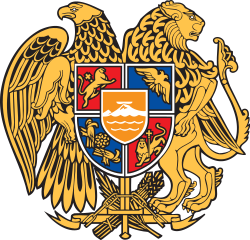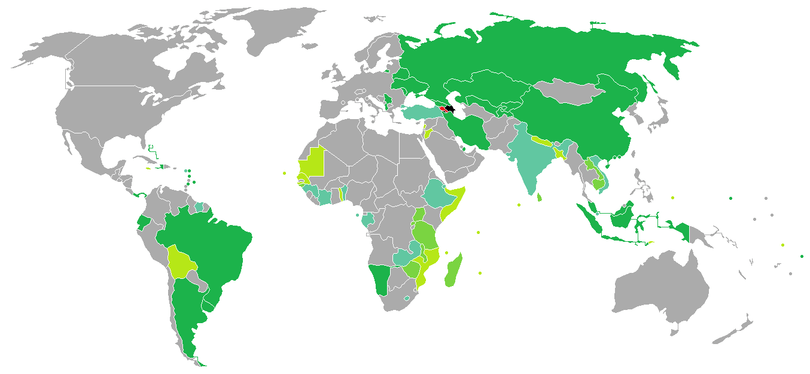Armenian nationality law
Armenian nationality law is based primarily on the principle of jus sanguinis. It was adopted on November 6, 1995 and was amended in 2007 which permitted dual citizenship.
| Armenian Citizenship Act | |
|---|---|
 | |
| Parliament of Armenia | |
Long title
| |
| Enacted by | Government of Armenia |
| Status: Current legislation | |
Acquisition of Armenian citizenship
The citizenship of Armenia is acquired:
- through recognition of citizenship;
- by birth;
- through acceptance into citizenship;
- through the restoration of the citizenship;
- through acceptance into citizenship by group;
- by the basis provided by the international treaties of Armenia.
It includes the right of return for members of the Armenian diaspora.
Birth
A child born in Armenia acquires the citizenship of Armenia if:
- the parents hold Armenian citizenship at the moment of the child's birth regardless of the place of the birth;
- one parent holds Armenian citizenship at the moment of the child's birth, whilst the other parent is unknown or stateless.
If, at the moment of child's birth, one of the parents holds an Armenian citizenship and the other parent is a foreign citizen, the determination of the child's citizenship is based on a written consent of both parents.
A child of stateless persons who was born in the territory of Armenia acquires citizenship of Armenia.
Recognition
The following persons are recognised as citizens of Armenia:
- Citizens of the former Arm. SSR permanently residing on the territory of the Republic of Armenia, who until the enactment of the Constitution, have not acquired citizenship of another State or have rejected that citizenship;
- Stateless persons or former citizens of other USSR republics who are not foreign citizens, permanently residing in the RA and before 31 December 2003, have applied for the acquisition of the RA citizenship (amended on 20 March 2002);
- Former citizens of the Armenian SSR, who live outside the Republic of Armenia and have not acquired citizenship of another country (amended on 12 April 2001).
Naturalization
Any person who does not have an Armenian citizenship may be granted citizenship of Armenia if he/she:
- is aged 18 or over;
- has resided legally in Armenia for the last 3 years;
- is proficient in the Armenian language;
- is familiar with the Constitution of Armenia.
A person who does not hold Armenian citizenship can be granted citizenship of Armenia without the condition of the term of residence, if he/she:
- marries a citizen of Armenia or has a child, father or mother who are citizens of Armenia; or
- has parents or at least one parent that had held citizenship of Armenia in the past or had been born on the territory of Armenia and had applied for the citizenship of Armenia within 3 years from becoming 18 years old; or
- is Armenian by his origin and has resided in the territory of Armenia.
The person accepting the citizenship of Armenia is to read the text of the oath in Armenian and sign it.
Dual citizenship
Dual citizenship was authorised after the constitutional amendment of the Armenian Citizenship Law No. 75-N on February 26, 2007.
Military service
Armenia retains the conscription policy, and in most cases, dual citizens are not exempted from the service. Consulting a licensed attorney specializing in Armenian Military Laws may be necessary to determine ones eligibility to be conscripted, as laws and rules regarding conscription tend to change.
The citizen of a foreign state who has accepted Armenian citizenship is exempt from compulsory military service if, before being admitted into the state record of Armenian citizenship, the citizen has served in the armed forces of the foreign state for no less than 12 months, or has completed alternative military service for no less than 18 months, except for the states defined by the Government of the Republic of Armenia.[1]
For Diaspora Armenians who wish to be exempt from military service, a Special Residency Status is also available in the Republic of Armenia.
Special Residency Status
Armenia allows foreign citizens to receive a 10-year Special Residency Status, granted to foreign citizens of Armenian ancestry and also to other distinguished individuals, who have provided significant services to the Armenian state and nation and/or are engaged in economic and cultural activities in Armenia.[2]
Those granted Special Residency Status are issued Special Armenian Passports and are no longer be required to obtain entry visas for traveling to Armenia. While in Armenia, they enjoy the full protection of the Armenian law, as well as the rights and obligations of Armenian citizens, except for the right to vote and to run for office, enroll in political organizations. They are exempt from military service in the Armed Forces of Armenia. The Special Passport, however, does not waive visa requirements for other CIS countries or to other countries that provide visa-free travel to bearers of an Armenian passport. Travelling to those countries requires the bearer of the Special Passport to use his or her national passport.[2]
The survivors of the Armenian Genocide are granted Special Passports through a facilitated procedure, and the application fee is waived.[2]
Visa requirements

In 2017, Armenian citizens had visa-free or visa on arrival access to 58 countries and territories, ranking the Armenian passport 78th in terms of travel freedom (tied with Beninese, Kyrgyzstani and Moroccan passports) according to the Henley visa restrictions index.[3]
See also
References
- "LAW OF THE REPUBLIC OF ARMENIA ON CONSCRIPTION Adopted by the National Assembly 16 September 1998" (PDF). Article 31. "Conscription of dual citizens".CS1 maint: others (link)
- "Special residency status - Ministry of Foreign Affairs of Armenia". www.mfa.am. Retrieved 2018-05-31.
The Law on Legal Status of Foreign Citizens in Armenia, enacted in 1994, and then the revised Law on Aliens allow foreign citizens to receive a Special Residency Status in Armenia. The Special Residency Status is granted by the President of Armenia to the foreign citizens of Armenian ancestry and also to other distinguished individuals, who have provided significant services to the Armenian state and nation and/or are engaged in economic and cultural activities in Armenia. The Special Residency Status is granted for a ten-year term. Those granted Special Residency Status will be issued Special Armenian Passports and will no longer be required to obtain entry visas for traveling to Armenia. While in Armenia, they will enjoy the full protection of the Armenian law, as well as the rights and obligations of Armenian citizens, except for the right to vote and to run for office, enroll in political organizations. They will be exempt from military service in the Armenian National Army. Please note, that Special Passport will not waive visa requirements for other CIS countries. For travel to those and other countries the bearer of Special Passport should use his/her national passport. The survivors of the Armenian Genocide are granted Special Passports through a facilitated procedure, and the application fee is waived.
- "Global Ranking - Visa Restriction Index 2017" (PDF). Henley & Partners. Retrieved 14 March 2017.
External links
http://arka.am/en/news/society/parliament_to_extend_amnesty_for_cash_scheme_for_military_dodgers/